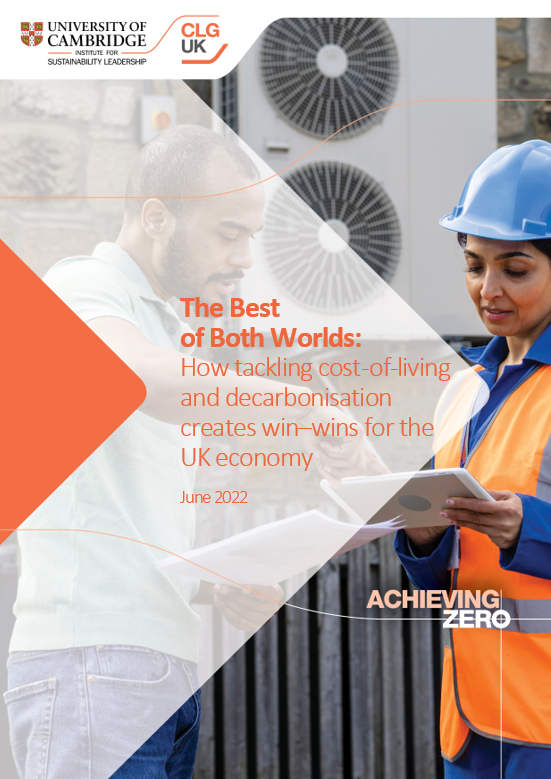27 June 2022 - New research by the UK Corporate Leaders Group indicates policies aiming to address the cost-of-living and energy crises and reduce emissions have better long-term impacts for the economy, environment and society.
Read the policy briefing.
Watch the launch webinar recording.
The Best of Both Worlds: How tackling cost-of-living and decarbonisation creates win-wins for the UK economy models packages costing the same to implement, but differing in type of measure, focus on low-income and vulnerable households, and how well they address climate change and the need to transition to net zero emissions.
The research found all modelled scenarios deliver similar economic impacts in the short and medium term, but that in the long-term the largest benefit is delivered by the climate positive scenario. In this package both the economic stimulus from policy spending and the long-term energy savings from energy efficiency contribute to a slight increase in GDP.
As the cost of living crisis continues to bite in the UK and inflation rises to a 40-year high, the report from business alliance the Corporate Leaders Group (CLG UK) calls on the government to act on its findings to align cost-of-living support measures and energy security strategy with the UK’s net zero target.
Beverley Cornaby, Policy Lead, CLG UK said:
“Climate change is inextricably linked into every major issue affecting countries and economies in the 21st century. It is therefore vital that we do not view every new crisis that emerges as a siloed issue that is disconnected from this. Both the cost of living crisis and the climate crisis disproportionately affect the poorest and most vulnerable in society, who also have fewest resources to cope with changing circumstances.
"Government policies could deliver better outcomes for people and the economy when they’re aligned to the UK’s net zero targets. CLG UK’s latest evidence reinforces that reality. This new report clearly indicates that a climate-aligned cost of living policy strategy will deliver long-term positives for GDP, society and the environment.”
Globally, countries are witnessing the worst cost of living crisis in decades, with the price of food, energy and fertilizers increasing rapidly. Even in developed countries, as many as one in four households are now struggling financially, with disposable incomes expected to fall further in 2022. In the UK, one estimate calculates that UK families are facing an increase in costs of £400 per month since last year, and inflation is currently at nine per cent – the highest level in more than 40 years.
Stephen Rouatt, CEO, Signify UKI said:
"Households in the UK are now in one of the most difficult situations as they see their energy bills rise by 54%, while businesses continue to struggle as well. We understand the urgency created by the energy-crisis to help families and businesses under pressure. Accelerating the switch to the LED guarantees quick wins by saving on energy bills as it can save an average British household £250* a year. As leaders in the lighting sector, we have a firm commitment to transformative action and urge the government, business leaders, climate professionals and communities to focus on accelerating rollout of an energy efficiency programme, including quick wins such as the switch to LED lighting, as a meaningful step forward in tackling the global climate action."
(*Signify UK data suggests that an average, a UK home has 15 incandescent bulbs on for 3 hours a day. Energy saving at 3 hours per day, 365 days, at 28p per kWh. Based on replacing 60W incandescent bulb with 60W equivalent (7w) LED bulb.)
The modelling, carried out by Cambridge Econometrics, indicates that a climate positive policy bundle can have a positive impact on UK employment in the long term, as well as the greater energy efficiency measures included in the scenario leading to lower energy bills. Overall, the report shows this package leads to an increase in household welfare, especially low income and vulnerable households which are specifically targeted by the climate positive policy scenario.
On emissions reduction impacts, the climate positive scenario shows a reduction in household carbon dioxide emissions of 26 per cent by 2050 from energy efficiency measures and uptake of heat pumps. The climate neutral policy package delivers just 5 per cent emissions reduction and a negligible change in emissions is seen in the climate negative scenario, where additional fossil fuel production would be expected largely to be exported.
Neil Freshwater, Public Affairs Manager, VELUX GB & Ireland said:
“The cost of living crisis, while very challenging, presents an opportunity to make our buildings greener and healthier in the long run, which will keep running costs down and move us towards meeting science based climate change targets. Government interventions must be focused on the long term as this is what gives business the necessary confidence to commit to supporting delivery, rather than the stop-start approach of the past. We very much welcome the launch of the CLG UK report, which sets out a sound foundation of how this can, and should, be achieved."
Building on the modelling results, CLG UK is calling on the UK government to deliver the following policy priorities:
1. Align the cost-of-living support measures and energy security strategy with the UK’s net zero target by focusing on reducing demand and future vulnerability, with a range of measures designed to address the needs of different household income categories. To maximise the benefits of public sector spending to mitigate the impacts of the cost-of-living crisis on UK households and economy, we would invite the government to consider the following actions:
- Direct all future cash payments to low-income households while also making it easier and more attractive for able-to-pay households to undertake energy efficiency improvements.
- Ensure that all new domestic and commercial buildings are energy and water efficient.
- Extend elements of the cost-of-living support package to businesses.
2. Align long-term incentives to encourage households and businesses to switch from fossil-fuel systems to electric alternatives.
- Facilitate investment in affordable zero carbon energy and ensure a secure and stable electricity supply.
Charles Wood, Deputy Director (Policy), Energy UK said:
“This report adds to the growing body of evidence that the best long-term solution to the cost-of-living crisis is to reduce energy demand while decarbonizing our power system. So we fully support the Corporate Leaders Group’s call for policies that unlock investment from consumers and businesses in energy efficiency improvements. Energy bills are not likely to return to their previous levels for the foreseeable future and it is therefore vital that we take a longer-term approach to the cost-of-living challenge. Similarly, the recommendation for Government to facilitate investment in affordable zero carbon energy is crucial. We need a policy landscape that encourages, not deters, the investment needed to meet our climate change targets.”




